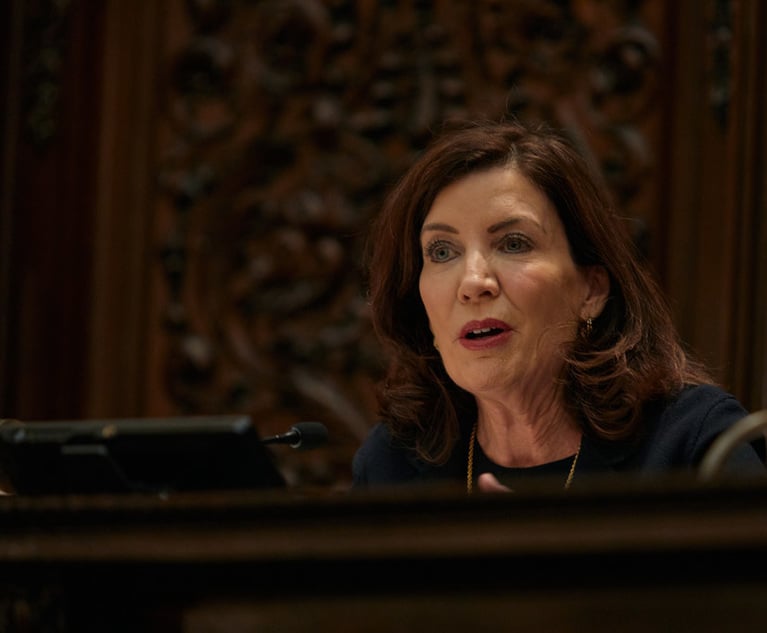Gorsuch, Alito and Kavanaugh Tangle Over Textualism in Major Win for LGBT Workers
Monday's landmark win for LGBT workers revealed intense disagreements within the court's conservative wing. Justice Samuel Alito called the majority decision, written by Justice Neil Gorsuch, "breathtaking" in its "arrogance." Added Kavanaugh: "The best way for judges to demonstrate that we are deciding cases based on the ordinary meaning of the law is to walk the walk."
June 15, 2020 at 03:21 PM
7 minute read
 A gay rights flag outside the U.S. Supreme Court. Credit: Diego M. Radzinschi / NLJ
A gay rights flag outside the U.S. Supreme Court. Credit: Diego M. Radzinschi / NLJ
The U.S. Supreme Court's landmark ruling applying the nation's workplace discrimination law to protect LGBTQ workers revealed intense disagreements within the court's conservative wing over who properly claimed the mantle of "textualism."
In a 2015 Harvard Law School lecture, Justice Elena Kagan, underscoring the legacy of the late Justice Antonin Scalia, said, "We are all textualists now." But in the court's Monday 6-3 decision in Bostock v. Clayton County, Georgia, textualism clearly meant different things to Justice Neil Gorsuch, who wrote the majority opinion, and dissenting Justices Samuel Alito Jr. and Brett Kavanaugh.
Gorsuch arrived at the Supreme Court with a firm reputation as an uncompromising textualist. He has written that a textualist should "strive (if humanly and so imperfectly) to apply the law as it is, focusing backward, not forward, and looking to text, structure, and history to decide what a reasonable reader at the time of the events in question would have understood the law to be."
In the Bostock case, the justices were asked to decide whether language in Title VII of the Civil Rights Act of 1964 that prohibits employers from discriminating "because of … sex" includes discrimination based on sexual orientation and gender identity.
"When the express terms of a statute give us one answer and extratextual considerations suggest another, it's no contest. Only the written word is the law, and all persons are entitled to its benefit," Gorsuch wrote.
There was no disagreement between Gorsuch and the dissenters about the basic approach to answering the question before them. "This court normally interprets a statute in accord with the ordinary public meaning of its terms at the time of its enactment," Gorsuch said. "To do so, we orient ourselves to the time of the statute's adoption, here 1964, and begin by examining the key statutory terms in turn before assessing their impact on the cases at hand and then confirming our work against this court's precedents."
But that is where the agreement ended. Gorsuch began his analysis by examining the words in text: "discriminate" and "because of" sex.
"The question isn't just what 'sex' meant, but what Title VII says about it," he wrote. "Most notably, the statute prohibits employers from taking certain actions 'because of' sex. And, as this court has previously explained, 'the ordinary meaning of 'because of ' is 'by reason of' or 'on account of.'" And the meaning of "discriminate" in 1964?
"As it turns out, it meant then roughly what it means today: 'To make a difference in treatment or favor (of one as compared with others),'" he wrote. "So, taken together, an employer who intentionally treats a person worse because of sex—such as by firing the person for actions or attributes it would tolerate in an individual of another sex—discriminates against that person in violation of Title VII."
The fact that congressional drafters in 1964 might not have anticipated this particular application of Title VII did not detract from the broad language in the statute, Gorsuch said.
"Likely, they weren't thinking about many of the act's consequences that have become apparent over the years, including its prohibition against discrimination on the basis of motherhood or its ban on the sexual harassment of male employees," Gorsuch wrote. "But the limits of the drafters' imagination supply no reason to ignore the law's demands."
 U.S. Supreme Court Justice Samuel Alito Jr. testifying in 2019. Credit: Diego M. Radzinschi / ALM
U.S. Supreme Court Justice Samuel Alito Jr. testifying in 2019. Credit: Diego M. Radzinschi / ALMAlito's dissent focused on the ordinary meaning of the statute's words in 1964. "If every single living American had been surveyed in 1964, it would have been hard to find any who thought that discrimination because of sex meant discrimination because of sexual orientation—not to mention gender identity, a concept that was essentially unknown at the time," he wrote.
In 1964, Alito said, homosexuality was thought to be a mental disorder and homosexual conduct was considered worthy of punishment. Sex reassignment surgeries weren't performed until 1966 and it was considered by some physicians as either "severely neurotic" or "psychotic," he added.
Alito called the majority's argument "breathtaking" in its "arrogance." He wrote: "Textualists do not read statutes as if they were messages picked up by a powerful radio telescope from a distant and utterly unknown civilization."
Kavanaugh took a slightly different approach in his dissent. He accused the majority of taking a "literalist," not a "textualist" approach to the language in Title VII. The primary wrong, he said, was taking the words individually instead of analyzing the entire phrase.
"Do not simply split statutory phrases into their component words, look up each in a dictionary, and then mechanically put them together again, as the majority opinion today mistakenly does," Kavanaugh wrote.
The majority opinion, Kavanaugh said, made another "fundamental" mistake by confusing ordinary meaning with subjective intentions. "To fire one employee because she is a woman and another employee because he is gay implicates two distinct societal concerns, reveals two distinct biases, imposes two distinct harms, and falls within two distinct statutory prohibitions," Kavanaugh argued.
 U.S. Supreme Court Justice Brett Kavanaugh. Credit: Diego M. Radzinschi / ALM
U.S. Supreme Court Justice Brett Kavanaugh. Credit: Diego M. Radzinschi / ALMKavanaugh said at one point in his dissent that he has "the greatest, and unyielding, respect for my colleagues and for their good faith." He continued: "But when this court usurps the role of Congress, as it does today, the public understandably becomes confused about who the policymakers really are in our system of separated powers, and inevitably becomes cynical about the oft-repeated aspiration that judges base their decisions on law rather than on personal preference."
"The best way for judges to demonstrate that we are deciding cases based on the ordinary meaning of the law is to walk the walk, even in the hard cases when we might prefer a different policy outcome," Kavanaugh wrote.
All three justices turned for support to Justice Antonin Scalia's opinion in Oncale v. Sundowner Offshore Services, which ruled that male-on-male sexual harassment violated Title VII but read that opinion differently.
The justices will soon have another opportunity to reveal their views on textualism when the court issues its decision in the "faithless electors" cases, but in those cases, the text to analyze will be the Constitution as well as statutes.
Read more:
Justice Gorsuch Would Be 'Grateful' if You'd Answer His Question
Former Roberts Clerk Will Argue Against LGBT Workers in New SCOTUS Term
EEOC Doesn't Sign Trump DOJ's Supreme Court Brief Against Transgender Employees
How Stanford's Pamela Karlan Got SCOTUS Argument Time in LGBT Cases
'I Wouldn't Write Those Words Today': Eugene Scalia Is Pressed About LGBT Rights
This content has been archived. It is available through our partners, LexisNexis® and Bloomberg Law.
To view this content, please continue to their sites.
Not a Lexis Subscriber?
Subscribe Now
Not a Bloomberg Law Subscriber?
Subscribe Now
NOT FOR REPRINT
© 2025 ALM Global, LLC, All Rights Reserved. Request academic re-use from www.copyright.com. All other uses, submit a request to [email protected]. For more information visit Asset & Logo Licensing.
You Might Like
View All
4th Circuit Upholds Virginia Law Restricting Online Court Records Access
3 minute read
'Religious Discrimination'?: 4th Circuit Revives Challenge to Employer Vaccine Mandate
2 minute read
4th Circuit Revives Racial Harassment Lawsuit Against North Carolina School District
3 minute read
Reported Refusal to Officiate Gay Wedding Prompts Review by NY Judicial Misconduct Watchdog
Trending Stories
- 1Which Legal Tech Jobs Are on the Rise, and Which Aren't, with Jared Coseglia
- 2Absent Explicit Agreement, Court Rejects Unilateral Responsiveness Redaction of Text Messages
- 3SEC Whistleblower Program: What to Expect Under the Trump Administration
- 4Sidley Hires Paul Hastings Energy Finance Partner in Houston
- 5Potential Pitfalls in Arbitrating Religious Disputes
Who Got The Work
J. Brugh Lower of Gibbons has entered an appearance for industrial equipment supplier Devco Corporation in a pending trademark infringement lawsuit. The suit, accusing the defendant of selling knock-off Graco products, was filed Dec. 18 in New Jersey District Court by Rivkin Radler on behalf of Graco Inc. and Graco Minnesota. The case, assigned to U.S. District Judge Zahid N. Quraishi, is 3:24-cv-11294, Graco Inc. et al v. Devco Corporation.
Who Got The Work
Rebecca Maller-Stein and Kent A. Yalowitz of Arnold & Porter Kaye Scholer have entered their appearances for Hanaco Venture Capital and its executives, Lior Prosor and David Frankel, in a pending securities lawsuit. The action, filed on Dec. 24 in New York Southern District Court by Zell, Aron & Co. on behalf of Goldeneye Advisors, accuses the defendants of negligently and fraudulently managing the plaintiff's $1 million investment. The case, assigned to U.S. District Judge Vernon S. Broderick, is 1:24-cv-09918, Goldeneye Advisors, LLC v. Hanaco Venture Capital, Ltd. et al.
Who Got The Work
Attorneys from A&O Shearman has stepped in as defense counsel for Toronto-Dominion Bank and other defendants in a pending securities class action. The suit, filed Dec. 11 in New York Southern District Court by Bleichmar Fonti & Auld, accuses the defendants of concealing the bank's 'pervasive' deficiencies in regards to its compliance with the Bank Secrecy Act and the quality of its anti-money laundering controls. The case, assigned to U.S. District Judge Arun Subramanian, is 1:24-cv-09445, Gonzalez v. The Toronto-Dominion Bank et al.
Who Got The Work
Crown Castle International, a Pennsylvania company providing shared communications infrastructure, has turned to Luke D. Wolf of Gordon Rees Scully Mansukhani to fend off a pending breach-of-contract lawsuit. The court action, filed Nov. 25 in Michigan Eastern District Court by Hooper Hathaway PC on behalf of The Town Residences LLC, accuses Crown Castle of failing to transfer approximately $30,000 in utility payments from T-Mobile in breach of a roof-top lease and assignment agreement. The case, assigned to U.S. District Judge Susan K. Declercq, is 2:24-cv-13131, The Town Residences LLC v. T-Mobile US, Inc. et al.
Who Got The Work
Wilfred P. Coronato and Daniel M. Schwartz of McCarter & English have stepped in as defense counsel to Electrolux Home Products Inc. in a pending product liability lawsuit. The court action, filed Nov. 26 in New York Eastern District Court by Poulos Lopiccolo PC and Nagel Rice LLP on behalf of David Stern, alleges that the defendant's refrigerators’ drawers and shelving repeatedly break and fall apart within months after purchase. The case, assigned to U.S. District Judge Joan M. Azrack, is 2:24-cv-08204, Stern v. Electrolux Home Products, Inc.
Featured Firms
Law Offices of Gary Martin Hays & Associates, P.C.
(470) 294-1674
Law Offices of Mark E. Salomone
(857) 444-6468
Smith & Hassler
(713) 739-1250








